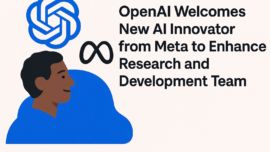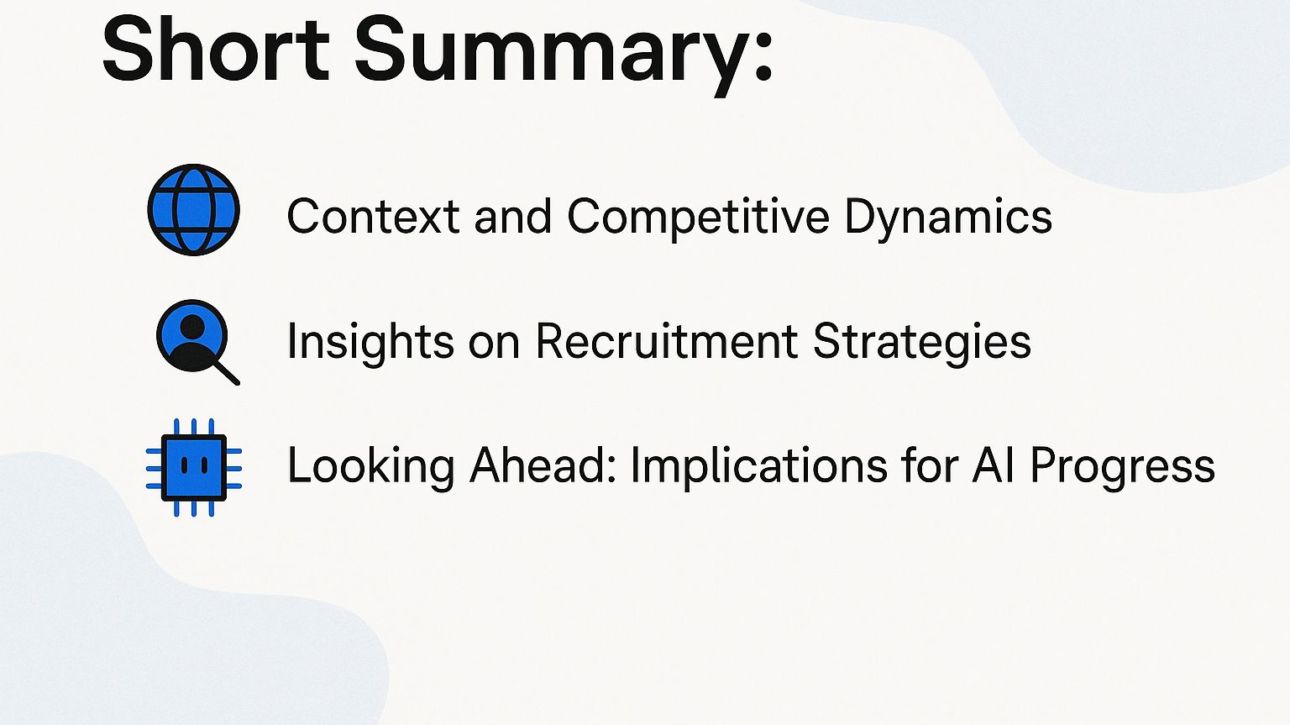Meta Platforms has made headlines again, luring top AI talent from rival OpenAI as it fortifies its initiatives in artificial intelligence research with a new wave of high-profile hires.
Contents
Short Summary:
- Meta has recruited several distinguished AI researchers from OpenAI for its superintelligence division.
- The company is waging a fierce competition for talent in a market driven by lucrative compensation packages.
- Meta’s strategic focus on open research contrasts with OpenAI’s traditional approach, prompting a significant shift in the AI landscape.
In a significant move to bolster its artificial intelligence (AI) capabilities, Meta Platforms has successfully recruited a number of notable AI researchers from its competitor, OpenAI. This initiative is part of a broader strategy to enhance its superintelligence division, which is focused on advancing AI systems that can perform tasks better than humans.
Among the latest recruits are prominent figures including Trapit Bansal, Lucas Beyer, Alexander Kolesnikov, and Xiaohua Zhai. Their expertise is expected to propel Meta toward achieving its ambitious goal of artificial general intelligence (AGI). Although specific roles for these researchers have not been disclosed, their backgrounds indicate they will be integral to the company’s AI efforts.
“Meta’s recruitment strategy emphasizes securing top-tier AI talent, with some offers reportedly reaching up to $100 million in signing bonuses,” noted industry experts. “Such aggressive compensation packages underline the shifting landscape of AI recruitment.”
Following the formation of its superintelligence lab, Meta is reportedly facing a war for AI talent, with significant efforts to attract researchers from various leading technology firms. The company aims to develop advanced AI models to surpass current benchmarks, especially in light of past setbacks like the delayed launch of its internally developed large language model, Llama 4 Behemoth.
In the competitive landscape, Meta’s CEO Mark Zuckerberg has placed a strong emphasis on hiring practices aimed at attracting researchers who value the opportunity for open scientific exploration. This contrasts with OpenAI’s more closed-off approach, which has been challenged by the rising trend of incentivizing AI talent through substantial financial packages.
Context and Competitive Dynamics
The recent moves by Meta can be seen as a direct response to the increasingly competitive AI environment, where organizations like OpenAI, Google DeepMind, and Microsoft are vying for the same pool of skilled professionals. Industry insiders reveal that Meta’s shifts have altered traditional expectations around compensation and recruitment in AI.
The recruitment wave, spearheaded by Zuckerberg, signifies Meta’s long-term vision for AGI, compelling researchers to join a workplace environment focused more on collaborative innovation. According to CEO Sam Altman of OpenAI, “None of our best people have decided to take him up on that,” referring to Meta’s recruitment tactics. However, the pull of substantial financial incentives has proven challenging for OpenAI, leading to speculation regarding its ability to maintain its top talent.
“The escalation in compensation structures signifies a monumental shift in how organizations value AI specialists, equating them to professional athletes or Hollywood stars,” highlighted a prominent analyst in the technology sector.
Just recently, a report indicated that Meta had extended offers not only to former OpenAI employees but had also strategically hired from other AI-driven companies. Its $14.3 billion investment into AI training dataset provider ScaleAI exemplifies the company’s commitment to acquiring comprehensive talent and resources. The addition of Alexandr Wang from ScaleAI to oversee AI endeavors demonstrates Meta’s resolve to lead AI advancements.
Insights on Recruitment Strategies
Simultaneously, Meta’s strategic hiring showcases an emerging trend towards acquiring entire research teams rather than individual researchers. This acquisition strategy, described as “acqui-hiring,” provides Meta immediate access to established operational workflows, ultimately accelerating development timelines.
The broadly competitive field entails not just recruiting for workforce strength but entails shifting organizational culture. Meta’s recent recruitment philosophy prioritizes financial incentives, starkly contrasting with the mission-driven ethos cultivated at OpenAI, where long-term goals are emphasized over immediate compensation.
Looking Ahead: Implications for AI Progress
The ramifications of these high-profile hires extend beyond just Meta’s immediate future. As the battle for AI talent intensifies, industry analysts predict a ripple effect across compensation benchmarks. Companies not only face losing their once-loyal employees but must also adapt to new recruitment paradigms characterized by intense competition for top minds in AI.
As Meta’s superintelligence lab gears up with this newly acquired talent, it poses a compelling question about the future landscape of AI research. What will this mean for OpenAI, whose ground-breaking models like ChatGPT have dominated the conversation in AI? The anticipation is palpable, with Meta’s ambitions likely to drive significant advancements in AI capabilities.
“The industry is evolving quickly, and how each company adapts their recruitment strategy may very well determine the leaders in AI for years to come,” stated a senior analyst at an AI research firm.
Moreover, as Meta invests approximately $65 billion this year in data center infrastructure to support AI initiatives, including plans for new data centers equipped with state-of-the-art technology such as NVIDIA graphics cards, the stakes have never been higher. The integration of AI into its platforms is aimed at similar levels of sophistication that currently characterize industry leaders, pushing the envelope for what is feasible in AI-driven applications.
In conclusion, the recent influx of AI specialists to Meta from OpenAI represents a pivotal shift in the competitive landscape of artificial intelligence. As Meta continues to expand its team and enhance its research capabilities, the impact will likely reverberate throughout the industry and set new standards for recruitment and compensation in the AI domain.
For those interested in keeping pace with the dynamic trends in AI and SEO, tools like Autoblogging.ai offer innovative solutions for generating SEO-optimized articles that can help bloggers and content creators stay relevant in this expanding field. The intersection of AI and blogging can potentially lead to more effective content creation strategies in the rapidly evolving tech landscape.
Do you need SEO Optimized AI Articles?
Autoblogging.ai is built by SEOs, for SEOs!
Get 30 article credits!



